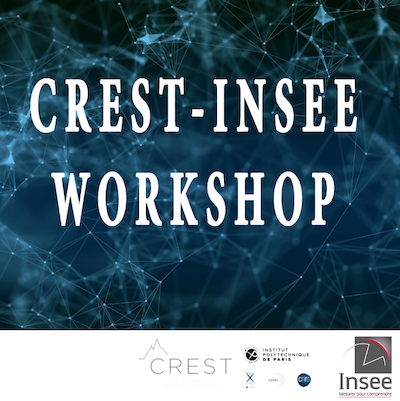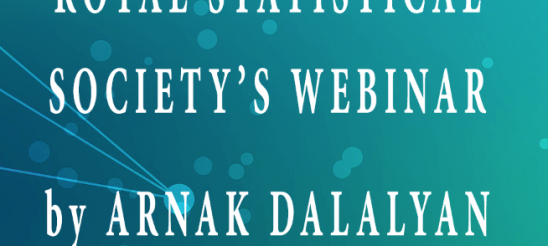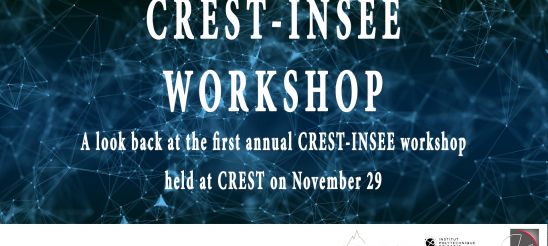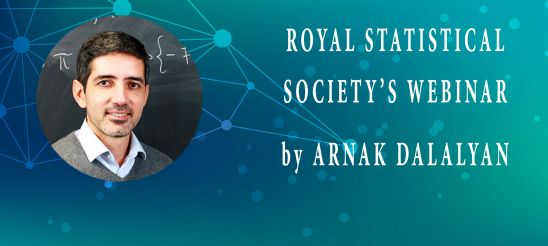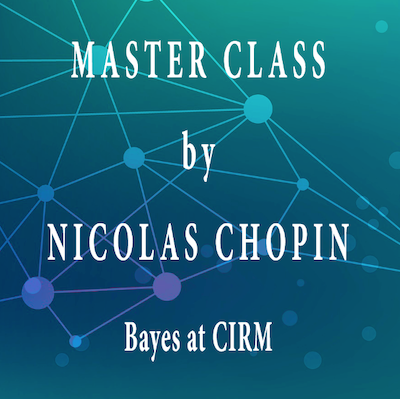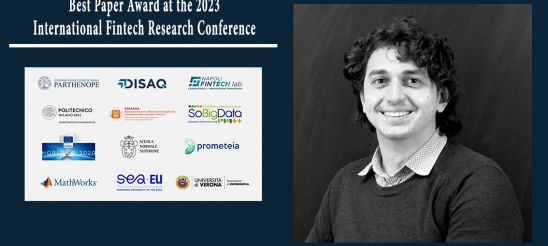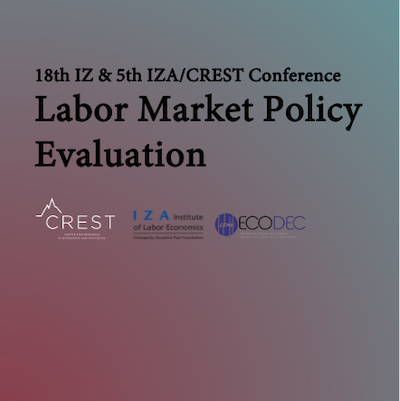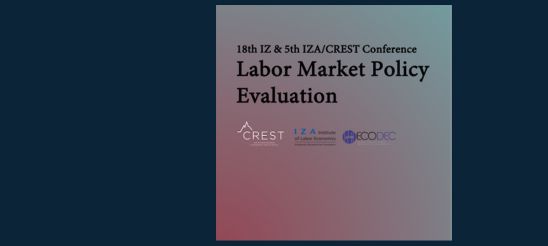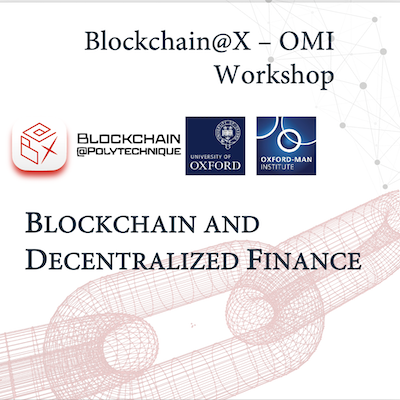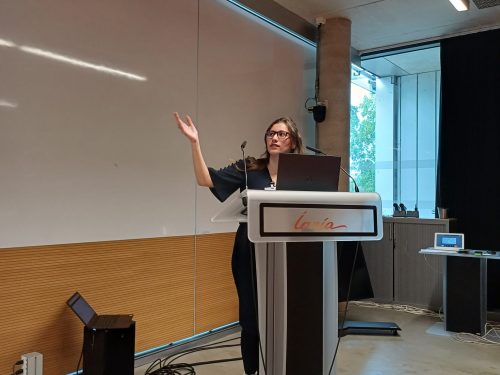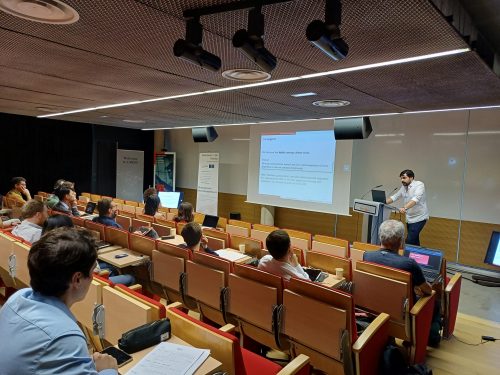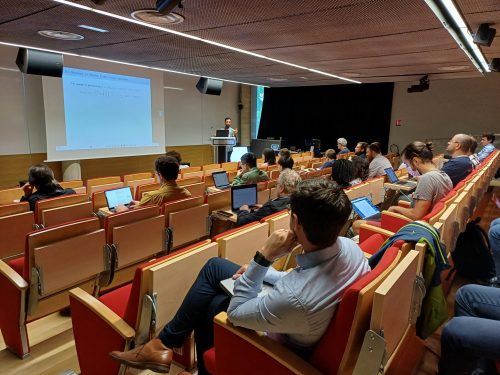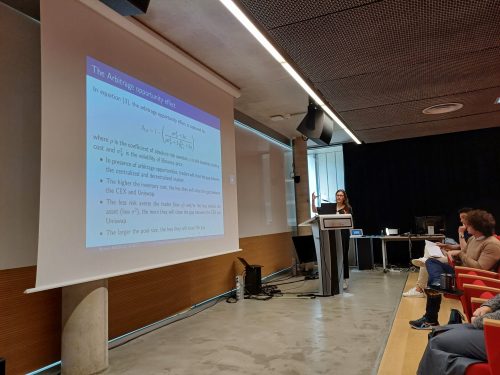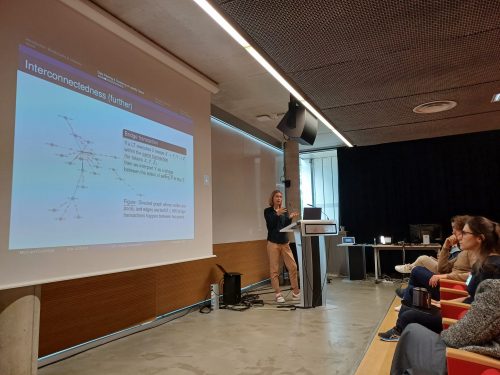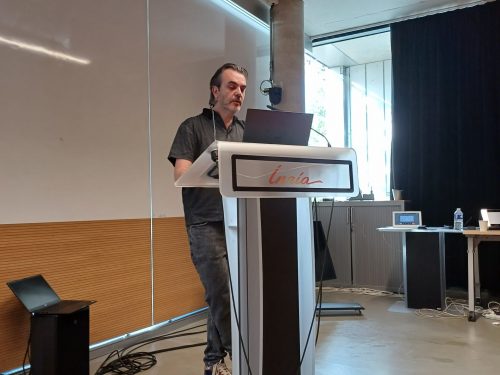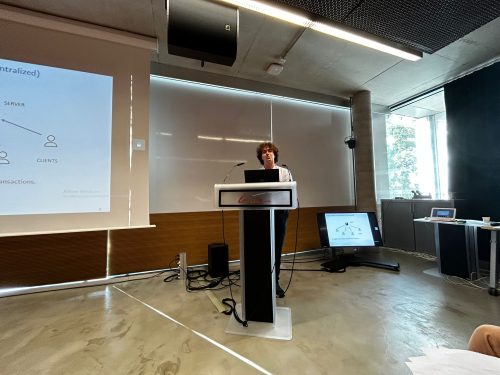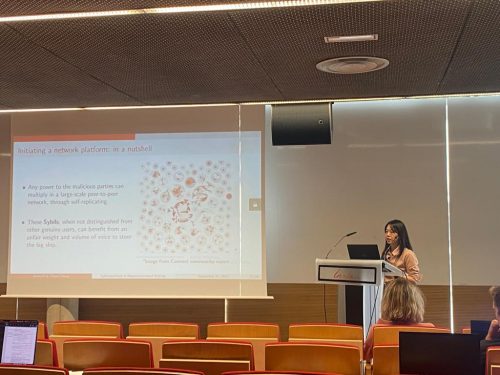On Wednesday 29th November, CREST welcomed for the first time the annual CREST-INSEE Workshop. The first workshop was held at INSEE, and the aim is now to make it an annual event held every two years at each institution.
Presentations were held by scientific personalities from CREST and D2E:
• Estimating Cross-Border Tobacco Purchases in France, Mélina Hillion (D2E)
• Firm Moral Hazard in Short-Time Work, Alice Lapeyre (CREST)
• Energy Cost Pass-Through: Evidence from French Manufacturers, Raphaël Lafrogne Joussier (D2E) (joint work with Julien Martin and Isabelle Méjean)
• Welfare Effects of Increasing Transfers to Young Adults: Theory and Evidence, Marion Brouard (CREST)
• Flood Risk and Residential Mobility in France, Julie Sixou (D2E) (joint with Christine Le Thi and Katrin Millock)
• Too Constrained to Grow. Analysis of Firms’ Response to the Alleviation of Skill Shortages, Sara Signorelli (CREST) (joint work with F. Fontaine)
The purpose of this workshop is to encourage and develop exchanges and research projects between CREST and the Economic Studies Department of INSEE. In front of a large audience, high-quality presentations on economic topics of wide interest (trade, environment, public economics, …) provided an opportunity to exchange views and ideas. A real success!
Catalyzing Conversation: The Royal Statistical Society’s Webinar on Dalalyan’s Paper ‘Theoretical Guarantees for Approximate Sampling from Smooth and Log-Concave Densities'”
On 31 October, the Royal Statistical Society webinar was devoted to Arnak S. Dalalyan’s 2017 Series B paper ‘Theoretical Guarantees for Approximate Sampling from Smooth and Log-Concave Densities’, featuring contributions from Hani Doss and Alain Durmus.
“[Dalalyan] combines techniques from convex optimisation with insights from random processes to provide non-asymptotic guarantees regarding the accuracy of sampling from a target probability density. These guarantees are notably simpler than those found in the existing literature, and they remain unaffected by dimensionality.
The findings pave the way for more widespread adoption of the mathematical and algorithmic tools developed in the field of convex optimization within the domains of statistics and machine learning.”
Showcasing significant recent papers published in the Society’s journals, the journal webinar format aims to bring authors closer to their audience in academia and industry. Impactful features of the paper are presented by the author, followed by contributions from the guest discussants.
A look back at the CREST-INSEE workshop
On Wednesday 29th November, CREST welcomed for the first time the annual CREST-INSEE Workshop. The first workshop was held at INSEE, and the aim is now to make it an annual event held every two years at each institution.
Presentations were held by scientific personalities from CREST and D2E:
• Estimating Cross-Border Tobacco Purchases in France, Mélina Hillion (D2E)
• Firm Moral Hazard in Short-Time Work, Alice Lapeyre (CREST)
• Energy Cost Pass-Through: Evidence from French Manufacturers, Raphaël Lafrogne Joussier (D2E) (joint work with Julien Martin and Isabelle Méjean)
• Welfare Effects of Increasing Transfers to Young Adults: Theory and Evidence, Marion Brouard (CREST)
• Flood Risk and Residential Mobility in France, Julie Sixou (D2E) (joint with Christine Le Thi and Katrin Millock)
• Too Constrained to Grow. Analysis of Firms’ Response to the Alleviation of Skill Shortages, Sara Signorelli (CREST) (joint work with F. Fontaine)
The purpose of this workshop is to encourage and develop exchanges and research projects between CREST and the Economic Studies Department of INSEE. In front of a large audience, high-quality presentations on economic topics of wide interest (trade, environment, public economics, …) provided an opportunity to exchange views and ideas. A real success!
Catalyzing Conversation: The Royal Statistical Society’s Webinar on Dalalyan’s Paper ‘Theoretical Guarantees for Approximate Sampling from Smooth and Log-Concave Densities'”
On 31 October, the Royal Statistical Society webinar was devoted to Arnak S. Dalalyan’s 2017 Series B paper ‘Theoretical Guarantees for Approximate Sampling from Smooth and Log-Concave Densities’, featuring contributions from Hani Doss and Alain Durmus.
“[Dalalyan] combines techniques from convex optimisation with insights from random processes to provide non-asymptotic guarantees regarding the accuracy of sampling from a target probability density. These guarantees are notably simpler than those found in the existing literature, and they remain unaffected by dimensionality.
The findings pave the way for more widespread adoption of the mathematical and algorithmic tools developed in the field of convex optimization within the domains of statistics and machine learning.”
Showcasing significant recent papers published in the Society’s journals, the journal webinar format aims to bring authors closer to their audience in academia and industry. Impactful features of the paper are presented by the author, followed by contributions from the guest discussants.
Advances in Bayesian Computation: A Masterclass on State-Space Models and Sequential Monte Carlo Algorithms by Professor Nicolas Chopin
Nicolas Chopin, Professor in Data Sciences / Statistics / Machine Learning
Nicolas Chopin is a Professor of Data Sciences/Statistics/Machine Learning at ENSAE Paris, Institut Polytechnique de Paris, and researcher at CREST.
He is particularly interested in all aspects of Bayesian computation, that is algorithms to perform Bayesian inference, including:
- Monte Carlo methods: particularly Sequential Monte Carlo, but also plain, quasi- and Markov chain Monte Carlo;
- Fast approximations: e.g. Expectation Propagation and variational Bayes.
Nicolas Chopin is currently an Associate editor of two journals, Annals of Statistics and Biometrika.
Last October, Nicolas Chopin was invited to give 2 Master Classes during the Autumn School in Bayesian Statistics.
Autumn School in Bayesian Statistics 2023
The objective of this autumn school is to provide a comprehensive overview of Bayesian methods for complex settings: modeling techniques, computational advances, theoretical guarantees, and practical implementation. It will include two masterclasses, on Sequential Monte Carlo and on Bayesian causal inference, tutorials on NIMBLE and on Bayesian Statistics with Python, and a selection of invited and contributed talks.
More information on the Autumn School in Bayesian Statistics 2023
Masterclass given by Nicolas Chopin on State-Space Models and SMC Algorithms
Nicolas Chopin gave a four-hour master class on state-space models and SMC algorithms (Sequential Monte Carlo, also known as particle filters) as part of the “Bayes at CIRM” autumn school, held at CIRM (CNRS permanent conference center for mathematics) from October 30 to November 3, 2023. State-space models have become very popular in recent years in all fields of application where a dynamic system is imperfectly observed, including epidemiology (modeling an epidemic such as COVID), robotics (navigation), finance (stochastic volatility), automatic language processing (grammatical function detection), and even image generation (diffusion-based methods). These models are particularly difficult to estimate. SMC algorithms have been developed over the last twenty years to meet this challenge. More recently, they have been extended to a more general class of problems and can now also be used to simulate any probability law, as effectively or even more effectively than MCMC (Markov chain Monte Carlo) algorithms.
In four hours, the master class presents an overview of all aspects of research in this field, from theory (convergence of algorithms), through the development of new algorithms and their efficient implementation in Python, to their application in different fields.
This master class is based on the speaker’s book (co-authored with Omiros Papaspiliopoulos): “An introduction to Sequential Monte Carlo” published by Springer :
https://link.springer.com/book/10.1007/978-3-030-47845-2
The master class was video-recorded and uploaded by CIRM on YouTube:
https://www.youtube.com/watch?v=0CpY1WdTkFE
https://www.youtube.com/watch?v=uuoGTBy1yH8
Advances in Bayesian Computation: A Masterclass on State-Space Models and Sequential Monte Carlo Algorithms by Professor Nicolas Chopin
Nicolas Chopin, Professor in Data Sciences / Statistics / Machine Learning
Nicolas Chopin is a Professor of Data Sciences/Statistics/Machine Learning at ENSAE Paris, Institut Polytechnique de Paris, and researcher at CREST.
He is particularly interested in all aspects of Bayesian computation, that is algorithms to perform Bayesian inference, including:
- Monte Carlo methods: particularly Sequential Monte Carlo, but also plain, quasi- and Markov chain Monte Carlo;
- Fast approximations: e.g. Expectation Propagation and variational Bayes.
Nicolas Chopin is currently an Associate editor of two journals, Annals of Statistics and Biometrika.
Last October, Nicolas Chopin was invited to give 2 Master Classes during the Autumn School in Bayesian Statistics.
Autumn School in Bayesian Statistics 2023
The objective of this autumn school is to provide a comprehensive overview of Bayesian methods for complex settings: modeling techniques, computational advances, theoretical guarantees, and practical implementation. It will include two masterclasses, on Sequential Monte Carlo and on Bayesian causal inference, tutorials on NIMBLE and on Bayesian Statistics with Python, and a selection of invited and contributed talks.
More information on the Autumn School in Bayesian Statistics 2023
Masterclass given by Nicolas Chopin on State-Space Models and SMC Algorithms
Nicolas Chopin gave a four-hour master class on state-space models and SMC algorithms (Sequential Monte Carlo, also known as particle filters) as part of the “Bayes at CIRM” autumn school, held at CIRM (CNRS permanent conference center for mathematics) from October 30 to November 3, 2023. State-space models have become very popular in recent years in all fields of application where a dynamic system is imperfectly observed, including epidemiology (modeling an epidemic such as COVID), robotics (navigation), finance (stochastic volatility), automatic language processing (grammatical function detection), and even image generation (diffusion-based methods). These models are particularly difficult to estimate. SMC algorithms have been developed over the last twenty years to meet this challenge. More recently, they have been extended to a more general class of problems and can now also be used to simulate any probability law, as effectively or even more effectively than MCMC (Markov chain Monte Carlo) algorithms.
In four hours, the master class presents an overview of all aspects of research in this field, from theory (convergence of algorithms), through the development of new algorithms and their efficient implementation in Python, to their application in different fields.
This master class is based on the speaker’s book (co-authored with Omiros Papaspiliopoulos): “An introduction to Sequential Monte Carlo” published by Springer :
https://link.springer.com/book/10.1007/978-3-030-47845-2
The master class was video-recorded and uploaded by CIRM on YouTube:
Michele Fabi Receives Best Paper Award at the 2023 International Fintech Research Conference
Michele Fabi, a postdoctoral fellow at CREST-École polytechnique has recently received the Award for the best paper presented at the International Fintech Research Conference, held at Parthenope University of Naples on 2-3 November 2023.
Michele Fabi
Michele Fabi is currently a post-doctoral researcher at CREST-Ecole polytechnique, serving as a member of the Blockchain and Platform Chair—a research initiative dedicated to blockchains and associated technologies.
Broadly speaking, Michele’s research fields are Financial Economics and Microeconomics, with a focus on topics such as fintech, platforms, decentralized and startup finance, blockchain, and the digitalization of money and markets. He is actively involved into a promoting research on these subjects by taking part in the organization of academic activities such as the BlockSem seminar and the Blockchain@X-OMI Workshop on Blockchain and Decentralized Finance.
Finally, Michele obtained his PhD in 2021 from the doctoral program IDEA-UAB (Universitat Autonoma de Barcelona), working with Matthew Ellman as his advisor.
In 2023-2024, Michele is one of CREST’s International Job Market candidate.
2nd International Fintech Research Conference
The International Fintech Research Conference is set to be a vibrant hub for researchers, encouraging cross-disciplinary discussions and collaborations in the expansive field of Fintech. Covering diverse areas, the conference welcomes contributions in theoretical analysis, machine learning applications, cryptocurrencies, cybersecurity, neural networks, smart contracts, and more.
With a focus on cutting-edge topics such as blockchain technologies, big data analysis, and behavioral finance, the event promises to be a dynamic platform for researchers to share insights, engage in discussions, and shape the future of finance and technology.
During this conference, the Organizing Committee establishes a prize for the best paper presented which was awarded, this year, to Michele Fabi for his paper “Blockchain Design with Transmission Delays”.
More information on the Conference: https://www.disaq.uniparthenope.it/fintechlab/international-fintech-research-conference/
Blockchain Design with Transmission Delays
The article investigates the economics of blockchain design. Unlike previous studies, this research introduces a strategic variable for miners: the ability to choose the size of transaction blocks. This departure from the assumption of maximum block capacity provides insights applicable to modern blockchains like Ethereum.
The study makes two key contributions. Firstly, it establishes testable predictions on block size and justifies transaction fees from the perspective of consensus layer incentives. This differs from earlier approaches that focused on application layer incentives. Secondly, the research addresses the limitations of a partial-equilibrium approach found in previous market microstructure papers. By endogenizing token inflation, the model can provide insights into the optimal balance between transaction fees and token inflation.
The paper builds upon prior works in the economics literature on blockchain and cryptocurrencies, pioneered by Chiu and Koeppl (2019) and Pagnotta (2022) among others, incorporating elements of the new monetarist matching models like Choi and Rocheteau (2020). It is also deeply inspired by the computer science literature on blockchain consensus and distributed algorithms (e.g. Pass and Shi, 2017; Ren, 2019), which lays out the methodological and conceptual foundations for the study of miner incentives.
In conclusion, the article sheds light on the economic challenges of blockchain designs, providing valuable insights for both researchers and practitioners in the blockchain space.
To read the full paper: https://drive.google.com/file/d/1VWGl65Mbg5iCSVNWnW3IMZZ1IL4oJuEU/view
18th IZ & 5th IZA/CREST Conference on Labor Market Policy Evaluation
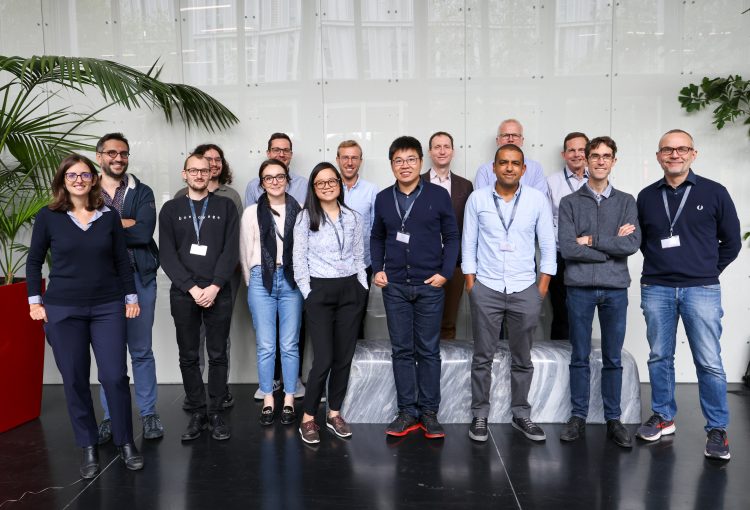
Sara Signorelli, Laurent Davezies, Clemens Mueller, Pedro Vergara Merino, Alice Lapeyre, Bernhard Schmidpeter, Alice Zulkarnain, Nicholas Swanson, Weilon Zhang, Roland Rathelot, Isaiah Andrews, Arne Uhlendorff, Jeffrey Grogger, Xavier D’Haultfoeuille, Marco Caliendo
The 5th IZA/CREST conference on Evaluation of Labor Policies was held at ENSAE on October 19 and 20 2023. It brought together international experts in the fields of labor economics and econometrics. Each participant gave a 45 minute talk and the range of topics that were covered was broad, ranging from applied policy evaluations to econometric approaches to measure causal effects. The keynote was delivered by Isaiah Andrews on Causal Interpretation of Causal IV Estimands.
The program of the conference can be found here: https://conference.iza.org/conference_files/EVAL_2023/program
18th IZ & 5th IZA/CREST Conference on Labor Market Policy Evaluation

Sara Signorelli, Laurent Davezies, Clemens Mueller, Pedro Vergara Merino, Alice Lapeyre, Bernhard Schmidpeter, Alice Zulkarnain, Nicholas Swanson, Weilon Zhang, Roland Rathelot, Isaiah Andrews, Arne Uhlendorff, Jeffrey Grogger, Xavier D’Haultfoeuille, Marco Caliendo
The 5th IZA/CREST conference on Evaluation of Labor Policies was held at ENSAE on October 19 and 20 2023. It brought together international experts in the fields of labor economics and econometrics. Each participant gave a 45 minute talk and the range of topics that were covered was broad, ranging from applied policy evaluations to econometric approaches to measure causal effects. The keynote was delivered by Isaiah Andrews on Causal Interpretation of Causal IV Estimands.
The program of the conference can be found here: https://conference.iza.org/conference_files/EVAL_2023/program
Blockchain@X-OMI Workshop on Blockchain and Decentralized Finance
The Blockchain@X-OMI Workshop on Blockchain and Decentralized Finance (DeFi) was held on September 21-22 2023 at the Alan Turing building at INRIA on the École Polytechnique campus.
A gathering of multidisciplinary minds
The workshop brought together 22 scholars from a variety of backgrounds, such as economics, computer science, and mathematics, who presented their working papers. The academic presentations were complemented by three industrial talks delivered by blockchain innovators of the private sector.
The workshop highlighted the importance of a multidisciplinary approach to its central topic: As experts from various fields discussed similar issues but from different angles, the combination of their insights improved everyone’s understanding. From the talks of blockchain innovators such as Kamea Labs, StarkWare, and Giza, the workshop also made evident that blockchain and DeFi research has a large potential for experimentation in the private sector.
Towards a better understanding of blockchain and decentralized finance ecosystems
The presentations were sectioned into six sessions with strong interlinks to the central theme of blockchain and decentralized finance (DeFi). On the first day, the workshop dived into topics concerning distributed consensus and the game theory of information aggregation in distributed systems. The successive session, on the financial analysis of Automated Market Makers (AMMs), received valuable discussions on how to employ stochastic optimal control tools to devise trading, liquidity provision, and risk prediction strategies in a Constant Product Market Maker (CPMM). The afternoon’s presentations shifted the focus towards the network security of DeFi protocols. Presenters identified existing attacks that weaken governance in DeFi ecosystems and devised machine learning and artificial intelligence solutions to mitigate them.
The second day started with an empirical network analysis of Decentralized Finance (DeFi) protocols. One presenter graphically analysed DeFi marketplaces to explain trading behaviours. Another presenter with a Physics background assessed the health of these new markets using an interesting analogy the ideal thermal law. In the afternoon, the workshop delved into AMM design, featuring six papers that pointed out the exploitable vulnerabilities of AMMs to liquidity providers in the face of swap fees and adversarial liquidation. Some papers shed light on alternative trading protocols by introducing external pricing oracles, looking beyond the CFMM formula, and using batch trading. The topic shifted more to the AMM ecosystem improvements, mixed with also a historical look into the distributed system refinements that moulded blockchains today.
The first event co-organized by Blockchain@X Research Centre (École Polytechnique) and Oxford-Man Institute of Quantitative Finance (University of Oxford)

Blockchain@X Research Centre and Oxford-Man Institute of Quantitative Finance crossed paths in examining the financial market structure unprecedentedly facilitated by blockchain technologies. The Blockchain@X chair is directed by Professor Julien Prat (CNRS & CREST, École Polytechnique, IP Paris) and Professor Daniel Augot (Inria Saclay & École Polytechnique, IP Paris). The chair bridges economics and computer science to broadly identify challenges in the blockchain today. This diversity of its researchers’ expertise was reflected in the presentations given by the team, ranging from mechanism design and macro-foundations of utility tokens, to econometric and graph data-driven analysis of DeFi protocols.
Carrying a similar vision, at the Oxford-Man Institute (OMI), led by Professor Álvaro Cartea (University of Oxford), has the mission of addressing fundamental problems in quantitative finance. In particular, the participating speakers covered DeFi topics with a strong focus on the ecosystems of liquidity pools and financial decision-making in these new trading venues.
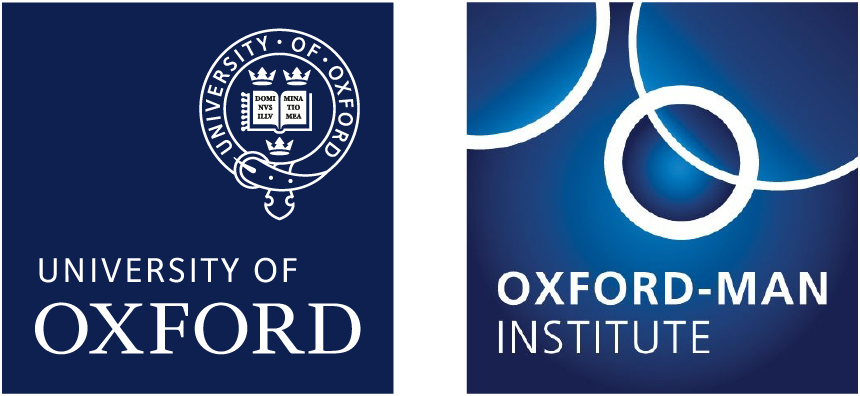
The Blockchain@X-OMI collaboration aimed at attracting academics and industrial partners to advance this emerging field of blockchain through research and application in Europe. Blockchain is a fast-evolving industry that has been absorbing endeavours from various studies that continuously inspect and propose implementations for improving performances. To synchronise the outputs from the university labs and the industry, this workshop served as an exchange channel to broadcast peoples’ work and incubate future collaborations.

